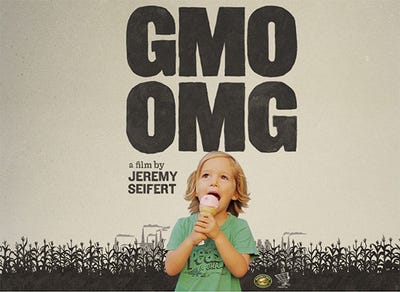Why you should help get film 'GMO OMG' into theatersWhy you should help get film 'GMO OMG' into theaters

 Last night I had the great pleasure of previewing the new documentary “GMO OMG” by filmmaker Jeremy Seifert. No stranger to examining the food system (Seifert also directed “Dive!,” a movie that followed “freegans,” a.k.a. dumpster divers, concerned about food waste), those who attended Expo West 2012 in Anaheim may remember the filmmaker discussing plans to create the GMO movie, with support from Ohio representative Dennis Kucinich and his wife, Elizabeth Kucinich.
Last night I had the great pleasure of previewing the new documentary “GMO OMG” by filmmaker Jeremy Seifert. No stranger to examining the food system (Seifert also directed “Dive!,” a movie that followed “freegans,” a.k.a. dumpster divers, concerned about food waste), those who attended Expo West 2012 in Anaheim may remember the filmmaker discussing plans to create the GMO movie, with support from Ohio representative Dennis Kucinich and his wife, Elizabeth Kucinich.
Seifert and producer Joshua Kunau secured funding, and created perhaps the most beautiful food movie I’ve ever seen.
“GMO OMG” is a film that the natural foods industry desperately needs. Whereas other GMO-focused documentaries are overtly scientific and technical, such as Jeffery Smith’s “Genetic Roulette”, “GMO OMG” is inspirational and designed for people who don’t religiously shop at natural retailers. This is illuminated at the beginning of the film, when Seifert asks pedestrians if they’ve ever eaten a GMO. Most people don’t know what they are, and are surprised, even appalled to learn that they’re omnipresent in nearly all processed food.
Emotional connection
But what’s so interesting about the film is Seifert’s journey to teach his (adorable) children about GMOs—a seemingly tough concept to grasp for adults, let alone 6-year-olds. He takes his kids into grocery stores, through drive-thru windows and on a road trip across the United States, teaching them what makes GMOs different from other seeds. It’s remarkable to see young children trying to comprehend the GMO issue.
Seifert films through the lens of a concerned parent, which, I think, will make it so much more salient to viewers. It humanizes the non-GMO movement because it stokes our innate parental protectiveness.
It’s also notable that Seifert interviews both organic farmers and farmers who use GMOs. He allows them equal screen time to foster an honest discussion about the morals and implications of using genetically engineered seeds. We see GMO farmers filling the reservoir of their tractors with Roundup and atrazine—an image most Americans (this one included) have never seen if they grew up in urban or suburban settings.
One farmer points out a giant glyphosate-resistant ragweed on the edge of his farm, and relates that his whole field would be covered in the “stuff” if he didn’t use Roundup. “Can you eat that?” jokes Seifert.
The most moving part of the movie was when Seifert allowed his children to Trick-or-Treat during Halloween. Afterwards, he films his kids pooling their Reese’s Peanut Butter Cups, Snickers and Skittles in big piles. They look exuberant as they sort and trade their candy—a memory many of us share.
The largest problem, Seifert explains, is that “opting out of GMOs is opting out of American culture.” GMOs are everywhere, and if parents want to avoid them they run the risk of depriving their kids childhood joys. “Who doesn’t want to buy their kids a treat from the ice cream truck on a hot day?” he asks.
The film is symbolic, moving, atmospherically gorgeous and a call to action. And it’s in the interest of the natural products industry to help it get into theaters. This, my friends, is the next iteration of Supersize Me.
Go to Nature's Path Facebook page or the film's website to donate.
About the Author
You May Also Like





